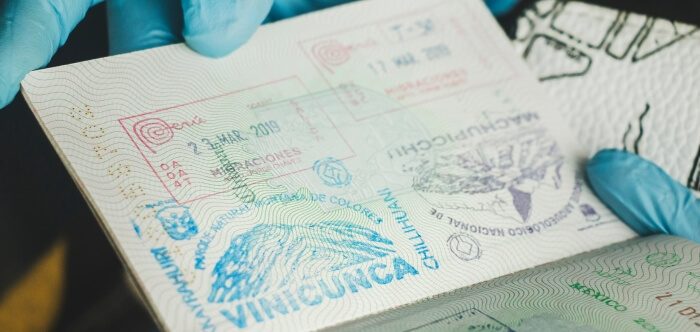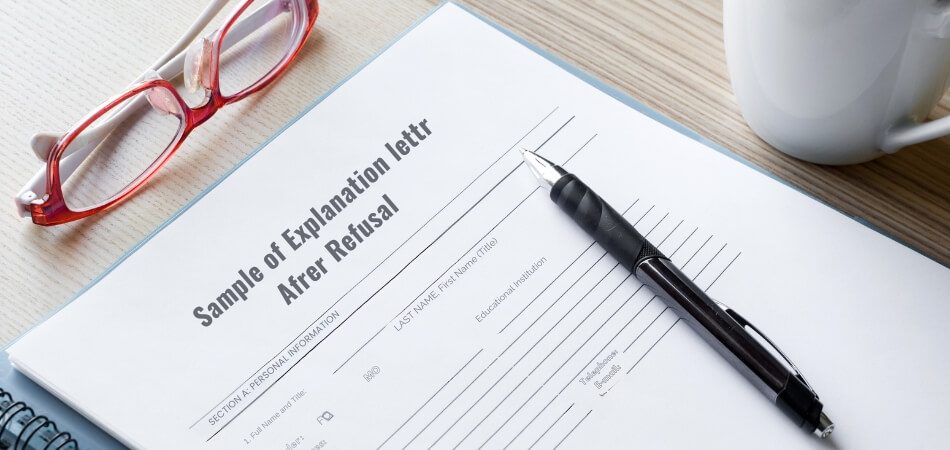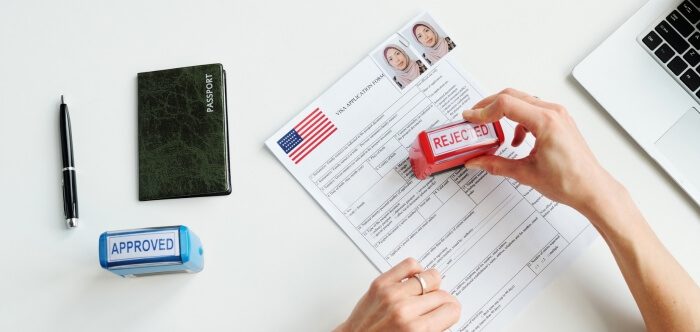Writing a letter of explanation after receiving a refusal can turn a negative situation into an opportunity for positive communication and clarity. This leads us to the pivotal question: How do you write a letter of explanation after refusal?
The key lies in constructing a comprehensive and persuasive narrative that addresses the reasons for refusal. It’s essential to justify or counter these reasons effectively, while also paying close attention to the nuances of spelling, grammar, structure, and format.
In this article, we guide you through the steps to craft a letter that not only responds to the refusal but also positions you favorably for reconsideration. Keep reading to learn how to transform a refusal into a chance for a second review.
Requirement for Visa Approval
Each country has unique criteria, but certain commonalities exist in the process worldwide. Understanding these key points is crucial for a successful application. Here are the general requirements for visa approval:
- Valid Passport: Your passport must be valid for at least six months beyond your planned stay, ensuring travel legality.
- Invitation letter: An invitation letter from the prestigious conference organizer stating the purpose, duration, and sponsorship can enhance approval chances.
- Application Form: Fully completed and signed application forms are mandatory, serving as your formal request for entry.
- Financial Proof: Demonstrating financial stability is crucial; it assures the host country of your ability to support yourself.
- Travel Itinerary: A detailed travel plan, including accommodation and return tickets, showcases your visit’s purpose and duration.
- Health Insurance: Possessing valid health insurance is often required, confirming your preparedness for any medical emergencies abroad.
- No Criminal Record: A clean criminal record is essential, as it reflects your compliance with legal standards and reliability.
- Visa Fees: Payment of the applicable visa fees is a prerequisite, covering the administrative costs of processing your application.
- Photographs: Recent, passport-sized photographs are required, adhering to specific size and background color guidelines.
While the specific requirements may vary, these general guidelines are instrumental in preparing for a visa application. Being thorough and attentive to these details significantly increases your chances of approval.
What Are the Reasons for Visa Refusal?
Understanding the common grounds for visa refusal is crucial for applicants. These reasons, while diverse, often follow certain patterns. Recognizing them can help in better preparing for a successful application.
Inadequat3e Documentation
Visa applications often get refused due to incomplete or incorrect documentation. It’s vital to provide all requested information accurately and comprehensively. Failing to submit essential documents like bank statements or identification can lead to immediate rejection. Ensure every document is up-to-date and relevant to your application.
Financial Insufficiency
A key reason for refusal is the lack of a sufficient amount of funds to obtain visa. Authorities need assurance that applicants can financially sustain themselves during their stay. Insufficient financial proof, like bank statements showing inadequate balance, raises concerns about potential overstaying. Demonstrating a stable financial status is, therefore, imperative for approval.
Violation of Visa Conditions
Previous violations of visa conditions can lead to refusal. If an applicant overstays or works illegally on a previous visa, it negatively impacts their credibility. Such a history suggests a disregard for the host country’s laws and regulations. Maintaining a clean travel record is thus essential for future applications.
Doubts on Return Intentions
Consulates often deny visas if they suspect the applicant won’t return to their home country. Lack of strong ties like family, employment, or property in the home country fuels this suspicion. Applicants need to convincingly demonstrate their intention to return post-visit. Establishing strong home ties can significantly mitigate this concern.
In summary, understanding these common reasons for visa refusal is a step toward a successful application. By addressing these areas proactively, applicants can enhance their chances of approval, ensuring a smoother journey toward their international aspirations.
How Do You Write a Letter of Explanation After Refusal?
Crafting a letter of explanation after a visa refusal is a strategic step towards reconsideration. This letter provides an opportunity to clarify and address the reasons behind the refusal. A well-written letter can significantly influence the decision in your favor.
Step-1. Understanding the Refusal Reasons
Begin by thoroughly reviewing the refusal letter. Identify the specific reasons for the refusal, as these will guide your response. Understanding these reasons is crucial to address each point effectively in your letter.
Step-2. Drafting a Clear Introduction
Start your letter with a clear introduction. Mention your name, application number, and the purpose of your letter. This sets a professional tone and aligns the focus of your response.
Step-3. Addressing the Reasons for Refusal
For each refusal reason, provide a detailed explanation or rectification. If the refusal was due to missing documents, mention that you have attached them. Be clear and concise in your explanations, directly addressing each point of concern.
Step-4. Providing Supporting Documents
Include any relevant documents that support your explanations. These could be additional financial statements, employment letters, or other evidence. Ensure these documents are organized and directly relate to the points you are addressing.
Step-5. Concluding with a Reconsideration Request
Conclude your letter by politely requesting a reconsideration of your application. Express your continued interest and commitment to comply with the visa requirements. A respectful and hopeful tone can leave a positive impression.
A well-crafted letter of explanation is a crucial tool in overcoming a visa refusal. By methodically addressing each reason for refusal and providing necessary documentation, you strengthen your case for reconsideration. Remember, clarity and professionalism in your approach can make a significant difference.
How to Re-Apply for a Visa Properly?
Re-applying for a visa can be a meticulous process, requiring attention to detail and adherence to specific guidelines. It’s crucial to understand the steps involved to ensure a smooth application. This guide outlines the key methods for re-applying for a visa, structured for clarity and ease of understanding.
Understanding Visa Requirements
The first step involves comprehensively understanding the specific requirements of the visa type. Different visas have varied criteria, which must be thoroughly researched. Applicants should consult the embassy’s website or contact officials for updated information. This ensures the application aligns with the current standards and expectations.
Gathering Necessary Documentation
Collecting all required documents is an essential part of the re-application process. Applicants need to ensure that documents like passports and financial statements are up-to-date. It’s advisable to check for any additional documents that might be required since the last application. Organizing these documents systematically can expedite the application process.
Filling the Application Form
Accurately completing the application form is critical for visa approval. Applicants must provide precise and truthful information on every part of the form. Attention to detail is key in avoiding mistakes that led to the initial rejection. Seeking assistance from visa experts or consultants can be beneficial at this stage.
Scheduling Interviews and Biometrics
Many visas require an interview and biometric data submission. Applicants should schedule these appointments at their earliest convenience. It’s important to prepare for the interview, focusing on clarity and honesty in responses. Biometric appointments are straightforward but require punctuality and adherence to set guidelines.
Re-applying for a visa demands a structured approach, focusing on understanding requirements, gathering documents, accurately filling out forms, and preparing for interviews. By following these methods diligently, applicants increase their chances of a successful visa application. Remember, thorough preparation and attention to detail are key in overcoming the complexities of visa re-application.
Tips to Avoid Visa Refusal
Applying for a visa can be a daunting task, often filled with uncertainty and anxiety. A key aspect of a successful application is avoiding common pitfalls that lead to refusal. Here are some strategic tips to help you make the process and increase the likelihood of approval:
- Ensure accuracy in your application; provide truthful, consistent information across all documents. Discrepancies or false information can lead to immediate refusal.
- Maintain a valid passport with sufficient empty pages and at least six months’ validity beyond your intended stay. An expired or nearly full passport can be grounds for denial.
- Demonstrate strong ties to your home country, such as employment, family, or property ownership. Consulates look for assurances that you will return home after your visit.
- Provide a clear travel itinerary with booked accommodations and return tickets. Vague travel plans or lack of confirmed bookings can raise concerns about your intent.
- Show financial stability with bank statements and proof of income. Consulates need evidence that you can support yourself financially during your stay.
- Obtain all necessary supporting documents, like invitation letters or sponsorship details. Incomplete applications or missing documents are common reasons for visa rejection.
- If applicable, provide a detailed cover letter explaining your travel purpose and plans. A well-written letter can clarify your intentions and reinforce your application.
- Prepare thoroughly for the visa interview, if required, showcasing confidence and honesty. Poor performance in interviews can be detrimental to your application.
Avoiding visa refusal hinges on meticulous preparation, honesty, and clarity in your application. By following these guidelines, you can present a strong case for your travel intentions and increase your chances of a successful visa application. Remember, attention to detail and adherence to visa regulations are paramount in managing this process.
Last Words
The process of dealing with visa applications and overturning refusals hinges on detailed and careful planning. It’s crucial to gather accurate documentation, present honest information, and respond proactively to any issues that arise.
Specifically, when tackling the challenge encapsulated in the query, “How do you write a letter of explanation after refusal?” the focus should be on a well-structured and sincere letter that addresses each reason for the refusal.
This approach, coupled with strict adherence to application guidelines and a strategic response to common causes of visa rejection, significantly boosts the likelihood of a favorable outcome. Patience, thoroughness, and a proactive attitude are indispensable in managing this intricate process successfully.








